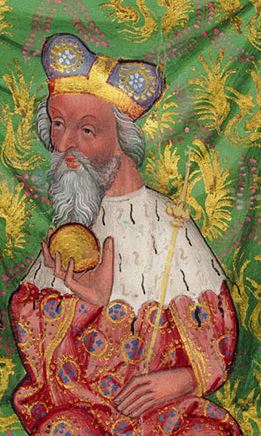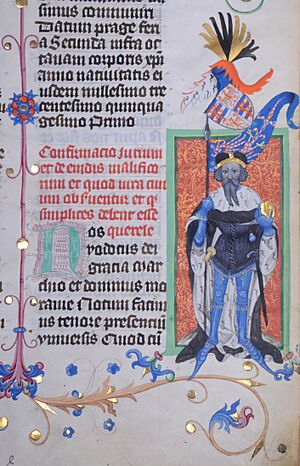Jobst of Moravia facts for kids
Quick facts for kids Jobst |
|
|---|---|

Near contemporary portrait, from the Olomouc Law Book, c. 1430
|
|
| King of Germany (formally King of the Romans) contested by Sigismund (1410–1411) |
|
| Reign | 1 October 1410 – 18 January 1411 |
| Predecessor | Rupert |
| Successor | Sigismund |
| Duke of Luxembourg | |
| Reign | 1388 – 18 January 1411 |
| Predecessor | Wenceslaus |
| Successor | Elisabeth |
| Elector of Brandenburg | |
| Reign | 1388 – 18 January 1411 |
| Predecessor | Sigismund |
| Successor | Sigismund |
| Margrave of Moravia | |
| Reign | 12 November 1375 – 18 January 1411 |
| Predecessor | John Henry |
| Successor | Sigismund |
| Born | c. 1354 |
| Died | 18 January 1411 (aged c. 56) Brno, Moravia |
| Spouse |
|
| House | Luxembourg |
| Father | John Henry, Margrave of Moravia |
| Mother | Margaret of Opava |
Jobst of Moravia (born around 1354 – died January 18, 1411) was an important ruler from the House of Luxembourg. He held many powerful titles during his life. He was the Margrave of Moravia starting in 1375. Later, from 1388, he also became the Duke of Luxembourg and an Elector of Brandenburg.
In 1410, Jobst was even chosen to be the King of Germany, also known as the King of the Romans. He was a very ambitious and skilled leader. He played a big role in the power struggles within his own family, the Luxembourg dynasty. He also had a major influence on who would rule the German lands in the early 1400s.
Contents
Jobst's Early Life and Family Connections
Jobst was likely born in 1354 in Brno, a city in Moravia. His father was Margrave John Henry. John Henry was the younger brother of Emperor Charles IV. This made Jobst a cousin to two other important rulers: Wenceslaus IV of Bohemia and his half-brother Sigismund. These family ties were very important in the politics of the time.
Becoming a Ruler and Gaining Power
When his father passed away in 1375, Jobst became the ruler of the Margraviate of Moravia. This was a region in Central Europe. He sometimes had disagreements with his younger brother, Prokop, and with the local bishops.
In 1388, Jobst gained control of the Duchy of Luxembourg. His cousin, King Wenceslaus, gave it to him as a pledge. This meant Wenceslaus owed Jobst something, and Luxembourg was held as a guarantee. In the same year, Jobst also became a Prince-elector of Brandenburg. This land was given to him by his other cousin, Sigismund. Sigismund was focusing on ruling the Kingdom of Hungary at the time.
Conflicts and Political Struggles
Jobst was often involved in political conflicts. In 1394, he joined a group of nobles from Bohemia called the League of Lords. This group was rebelling against his cousin, King Wenceslaus. Jobst even had Wenceslaus arrested at Prague Castle. Wenceslaus was later held by the Austrian Starhemberg family.
Eventually, peace was made thanks to Wenceslaus's brothers, Sigismund and John of Görlitz. Once Wenceslaus was free, he made sure Jobst was removed from Prague. In 1401, Jobst and Sigismund signed a treaty. This agreement said they would inherit each other's lands if one of them died. However, they later had another falling out.
The Election for King of Germany
After King Rupert of Germany died in 1410, a new king needed to be chosen. On October 1, four of the seven powerful prince-electors chose Jobst as the next king. This was a challenge to his cousin Sigismund. Sigismund had already been chosen by three electors on September 10. The deciding vote came from Jobst's cousin Wenceslaus, who was the King of Bohemia.
Even though Jobst had more support from the electors, he sadly died on January 18, 1411. His death cleared the way for Sigismund to be elected King of the Romans. Sigismund later became the Holy Roman Emperor.
Jobst's Marriages
Jobst was married two times, but he did not have any children.
- He married Elisabeth of Opole (1360–1374) in 1372. She was the daughter of Duke Władysław Opolczyk.
- He then married Agnes of Opole (died 1409) in 1374. She was the daughter of Duke Bolesław (Bolko) II of Opole and sister of Duke Władysław.
Important Titles Held by Jobst
Jobst held many significant titles during his life, showing his power and influence:
- King of the Romans (King of Germany)
- Margrave of Moravia, Lusatia, and Brandenburg
- Elector of Brandenburg
- Duke of Luxembourg
- Vicarius of Italy (a representative of the Holy Roman Emperor in Italy)
- Vicarius of the Holy Roman Empire (a representative of the Holy Roman Emperor in the Empire)
 | Audre Lorde |
 | John Berry Meachum |
 | Ferdinand Lee Barnett |


